Bus Denationalization : Operators Anxious About Delay
Page 63

If you've noticed an error in this article please click here to report it so we can fix it.
SERIOUS anxiety is felt by the Public Transport Association and the Passenger Vehicle Operators' Association over the Government's failure to denationalize' road passenger transport. They foresee that, under present conditions, the next Labour Government will be able to impose complete nationalization on a scale not yet envisaged.
The 1953 Act, they say, has repealed the power to make area schemes, as well as the provisions of the 1947 Act regarding compensation for nationalization. Area schemes have, however. shown to be unworkable and inevitably a Socialist Government would have to amend the 1947 Act. In the absence of denationalization of road passenger transport, the 1953 Act merely saves a new Labour Administration the embarrassment of repealing its predecessor's own Act.
They therefore suggest that immediate steps should be taken to divest the British Transport Commission of their bus interests. The 1953 Act allows the Minister of Transport to direct that the Commission should sell 50 per cent, of the shares in the State-owned bus companies. Unless, however, the shares were bought by one organization, the Commission which is concerned mainly with the railways, would still be the dominating influence. A way out of the difficulty would be for the 50-per-cent. block of shares to be bought by a commercial holding company. which would then sell them to the public.
The Associations believe that the Minister must have intended to use powers given to him under the Act. The longer he delays doing so, however, the more difficult it must be for the Government to refute the charge that it has tacitly approved of bus nationalization. The continuance of State participation in bus operation provides a springboard for further nationalization.
Stressing the importance of denationalization in the public interest, the Associations point to the advantages of local control. It is well known that no B.T.C.-owned bus company can apply for licences for new services which might compete with the railways without permission from the railways. There is a right of appeal by the bus company to the chairman of the B.T.C.. but the Commission's holdings in the railways are much greater than in road transport.
The Associations have not been slow to point out these facts to the Minister and to Conservative Members of Parliament. They have contrasted with this form of control the local autonomy enjoyed by the general manager of, say, a B.E.T. company. The B.E.T. have openly stated that they do not wish to expand further, but they want security from nationalization. In this attitude they are being supported by the smaller operators in the P.V.O.A.
It is believed that the Commission have perpetuated the Tilling organization merely because they were afraid to abolish it while private-enterprise companies existed. If it had been destroyed before private ownership of passenger transport had been ended, the full evils of nationalization would have been apparent. This is thought to have been a deliberate policy pending the acquisition of other bus companies when area schemes were created. When nationalization was completed, the Tilling and other acquired companies would cease to be separate entities.
Further nationalization has been prevented by the 1953 Act and there is no reason why the separate companies should continue. The Commission could directly operate the services and establish an undertaking similar to that of the railways.








































































































